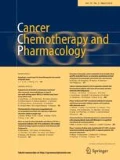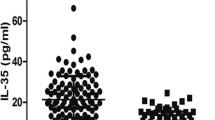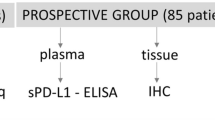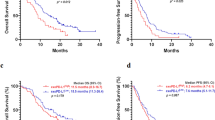Abstract
Purpose
M30 and M65 are different circulating fragments of cytokeratin 18. They release during apoptotic cell death, so it is believed that they reflect cell death of epithelial tumors. The aim of this study was to determine the prognostic value of plasma M30 and M65 levels in predicting of survival for patients with advanced gastric cancer compare with healthy controls.
Methods
Thirty-four patients with advanced gastric cancer and thirty-two healthy controls were included. Plasma M30 and M65 values were measured by quantitative ELISA method.
Results
The median age of patients and control groups was 60 and 56 years, respectively. No difference was detected between patient and control groups with respect to plasma median M30 values (390.4 vs. 270.7 U/l, respectively, P = 0.10). The median plasma M65 values of patients were significantly higher than those of control group (1232.1 vs. 580.1 U/l, P < 0.001). The best cut-off values for plasma M30 and M65 for predicting progression-free survival (PFS) were 277.7 and 1434.9 U/l in ROC analysis. The patients whose plasma M30 values were higher than 277.7 U/l had worse PFS than patients with plasma M30 value <277.7 U/l (8.9 vs. 11.2, respectively, P = 0.01). The median PFS of patients whose M65 levels lower than or equal to 1434.9 U/l was better than that of patients whose M65 levels were >1434.9 U/l (12.4 vs. 10.4, respectively, P = 0.04). But plasma M30 and M65 level in patient group were not found to be an important prognostic factor for PFS in the multivariate analysis.
Conclusions
These results showed that plasma M65 values were significantly elevated in patients with advanced gastric cancer compared to healthy people. Moreover, both increased plasma M30 and M65 levels can predict PFS in patients with gastric cancer.


Similar content being viewed by others
References
Caulín C, Salvesen GS, Oshima RG (1997) Caspase cleavage of keratin 18, reorganization of intermediate filaments during epithelial cell apoptosis. J Cell Biol 138:1379–1394
Ku NO, Liao J, Omary MB (1997) Apoptosis generates stable fragments of human type I keratins. J Biol Chem 272:33197–33203
Bivén K, Erdal H, Hägg M et al (2003) A novel assay for discovery, characterization of pro-apoptotic drugs, for monitoring apoptosis in patient sera. Apoptosis 8:263–268
Kramer G, Erdal H, Mertens HJ et al (2004) Differentiation between cell death modes using measurements of different soluble forms of extracellular cytokeratin 18. Cancer Res 64:1751–1756
Ueno T, Toi M, Linder S (2005) Detection of epithelial cell death in the body by cytokeratin 18 measurement. Biomed Pharmacother 59:S359–S362
Leers MP, Kölgen W, Björklund V et al (1999) Immunocytochemical detection, mapping of a cytokeratin 18 neo-epitope exposed during early apoptosis. J Pathol 187:567–572
Galluzzi L, Maiuri MC, Vitale I, Zischka H, Castedo M, Zitvogel L, Kroemer G (2007) Cell death modalities: classification, pathophysiological implications. Cell Death Differ 14:1237–1243
Yaman E, Coskun U, Sancak B, Buyukberber S, Ozturk B, Benekli M (2010) Serum M30 levels are associated with survival in advanced gastric carcinoma patients. Int Immunopharmacol 10:719–722
Demiray M, Ulukaya EE, Arslan M et al (2006) Response to neoadjuvant chemotherapy in breast cancer could be predictable by measuring a novel serum apoptosis product, caspase-cleaved cytokeratin 18: a prospective pilot study. Cancer Invest 24:669–676
Ueno T, Toi M, Bivén K, Bando H, Ogawa T, Linder S (2003) Measurement of an apoptotic product in the sera of breast cancer patients. Eur J Cancer 39:769–774
Ulukaya E, Yilmaztepe A, Akgoz S, Linder S, Karadag M (2007) The levels of caspase-cleaved cytokeratin 18 are elevated in serum from patients with lung cancer, helpful to predict the survival. Lung Cancer 56:399–404
Olofsson MH, Ueno T, Pan Y et al (2007) Cytokeratin-18 is a useful serum biomarker for early determination of response of breast carcinomas to chemotherapy. Clin Cancer Res 13:3198–3206
Ozturk B, Coskun U, Sancak B, Yaman E, Buyukberber S, Benekli M (2009) Elevated serum levels of M30, M65 in patients with locally advanced head, neck tumors. Int Immunopharmacol 9:645–648
Ausch C, Buxhofer-Ausch V, Olszewski U, Hinterberger W, Ogris E, Schiessel R, Hamilton G (2009) Caspase-cleaved cytokeratin 18 fragment (M30) as marker of postoperative residual tumor load in colon cancer patients. Eur J Surg Oncol 35:1164–1168
Dive C, Smith RA, Garner E et al (2010) Considerations for the use of plasma cytokeratin 18 as a biomarker in pancreatic cancer. Br J Cancer 102:577–582
de Haas EC, di Pietro A et al (2008) Simpson KL,Clinical evaluation of M30, M65 ELISA cell death assays as circulating biomarkers in a drug-sensitive tumor, testicular cancer. Neoplasia 10:1041–1048
Jemal A, Siegel R, Ward E, Hao Y, Xu J, Thun MJ (2009) Cancer statistics 2009. CA Cancer J Clin 59:225–249
Desai AM, Pareek M, Nightingale PG, Fielding JW (2004) Improving outcomes in gastric cancer over 20 years. Gastric Cancer 7:196–201
Galizia G, Lieto E, Orditura M et al (2007) Epidermal growth factor receptor (EGFR) expression is associated with a worse prognosis in gastric cancer patients undergoing curative surgery. World J Surg 31:1458–1468
Kim JG, Sohn SK, Chae YS et al (2007) Vascular endothelial growth factor gene polymorphisms associated with prognosis for patients with gastric cancer. Ann Oncol 18:1030–1036
Abe T, Fukumoto M, Tsuchiya K et al (1989) Human monoclonal antibodies against cytokeratin 18 generated from patients with gastric cancer. Jpn J Cancer Res 80:271–276
Xu W, Zhang MW, Huang J, Wang X, Xu SF, Li Y, Wang SJ (2005) Correlation between CK18 gene, gastric carcinoma micrometastasis. World J Gastroenterol 11:6530–6534
Greene FLPD, Fleming ID (2002) American joint committee on cancer staging manual, 6th edn. Springer, Philadelphia
Wu YX, Wang JH, Wang H, Yang XY (2003) Study on expression of Ki-67, early apoptotic protein M30 in endometrial carcinoma, their correlation with prognosis (article in Chinese). Zhonghua Bing Li Xue Za Zhi 32:314–318 (article in Chinese)
Hou JM, Greystoke A, Lancashire L et al (2009) Evaluation of circulating tumor cells, serological cell death biomarkers in small cell lung cancer patients undergoing chemotherapy. Am J Pathol 175:808–816
Ausch C, Buxhofer-Ausch V, Olszewski U, Schiessel R, Ogris E, Hinterberger W, Hamilton G (2009) Circulating cytokeratin 18 fragment m65-a potential marker of malignancy in colorectal cancer patients. J Gastrointest Surg 13:2020–2026
Author information
Authors and Affiliations
Corresponding author
Rights and permissions
About this article
Cite this article
Bilici, A., Ustaalioglu, B.B.O., Ercan, S. et al. Is there any impact of plasma M30 and M65 levels on progression-free survival of patients with advanced gastric cancer?. Cancer Chemother Pharmacol 68, 309–316 (2011). https://doi.org/10.1007/s00280-010-1480-0
Received:
Accepted:
Published:
Issue Date:
DOI: https://doi.org/10.1007/s00280-010-1480-0




